-
Fiction
-
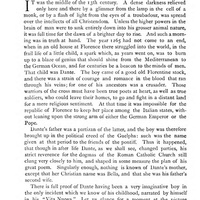 "Dante"
"Dante"
-
King, Alice
Alice King - Wikipedia entry
-
Emma Endicott Marean
Emma Endicott Marean (January 20, 1854 - October 17, 1936) was an American poet and hymn writer.
-
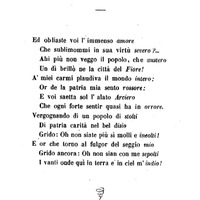 "Quai parole volgerebbe Dante Alighieri agl'italiani del secolo xix"
"Quai parole volgerebbe Dante Alighieri agl'italiani del secolo xix"
-
"Pel Centenario di Dante; [poem]"
-
Adelia Creonti
-
"Browning and Dante"
-
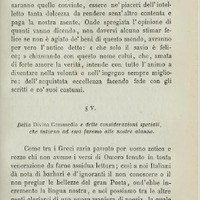 "Della Divina Commedia e delle considerazioni speciali, che intorno ad essa faremo alle nostre alunne"
"Della Divina Commedia e delle considerazioni speciali, che intorno ad essa faremo alle nostre alunne"
-
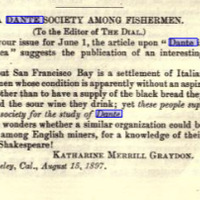 "A Dante Society among fishermen"
"A Dante Society among fishermen"
-
"Un fiore alla sacra memoria di Dante; sonetto"
-
La critica dantesca a Verona nella seconda metà del secolo XVIII
-
 Maria Zamboni
Maria Zamboni
-
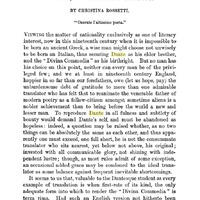 "Dante: an English Classic"
"Dante: an English Classic"
-
Dante Map (Italian Edition)
-
 Tonini, Rosmunda
Tonini, Rosmunda
-
 Ware Paine, Selma (1847 - 1917)
Ware Paine, Selma (1847 - 1917) Selma Ware Paine (1847-1917) was a published writer and musician from Bangor, Maine who addressed the World's Parliament of Religion with an essay entitled "The Womanly Nature," which emphasized the importance of a woman's following her own path, regardless of the strictures of society. This idea was nurtured by her faith in Swedenborg principles, which stressed the concept of usefulness and the theory of the masculine and feminine nature; that a man or woman must follow one's own path in life or risk the consequences of going against one's own nature.
-
 Stevens, Sarah J. D. (1839 - ?)
Stevens, Sarah J. D. (1839 - ?) Mrs S. J. D. Stevens was born in Belfast, Me., July 17, 1839. Her parents, Benjamin and Eliza Dyer, soon removed to Troy, Me., where she has since resided. Previous to her marriage to Augustus Stevens, in 1861, she taught several district schools. Inherited scholarly tastes and an intense delight to wield the pen from parents and ancestors of each, although a natural diffidence and love of retirement have kept their rich thoughts hidden from the world. Her maternal grandfather was Hon. Hezekiah Chase of Amity, Me., whose widow, a beautiful and brilliant woman at the age of one hundred and one, still retains an active mind, and much personal beauty. the only grandchildren who inherit the name are Prof. G. C. Chase, of Bates College, and Rev. J. Aubury Chase, of Chelmsford, Mass. Mrs. Stevens has three children — one a student in Boston Conservatory, one in New York Medical School, and the youngest in Bates College. The education of her children has closely occupied the time and thought of the mother, but during the last two or three tears has given some time to the C. L. S. C. readings, and written several poems, mostly composed while doing the work that falls to the lot of the farmer’s wife. The Boston “Morning Star” is occasionally enriched with Mrs. Stevens’s contribution.
-
Sherman, Caroline K.
-
Lillie, Lucy C.
-
Duncan Psychowska, Lucia
-
Wilder Fellowes, Caroline
-
Sanborn, Frances B. (1841 - ?)
Mrs. Frances B. Sanborn, one of the most scholarly, cultured, and intellectual of the daughters of New Hampshire, was born in Littleton, November 15, 1841. From her parents, Henry Adams Bellows, late chief justice of the supreme court of the state, and Katherine Walley Bellows, the daughter inherited an estate in literary and intellectual gifts, in refinement of character and taste, in a sympathetic nature, and delicacy of moral perception.
Her father removed to Concord in 1850, and Mrs. Sanborn attended the public schools in that city. In 1861 she entered the sophomore class of Antioch College, Ohio, of which her uncle, the late Thomas Hill, D. D., was president. Under his instruction, she went through the course of study, and made up the work of four terms in one, and graduated in 1863. In 1872 she was married to Hon. Chas. P. Sanborn, a brilliant lawyer, once speaker of the house of representatives, and identified with the political interests of the state. Mr. Sanborn died in 1888, leaving
three children. With an indomitable will, with wide learning, and an extraordinary gift at inspiring the love of learning in others, and a happy facility of imparting knowledge from her own abundant stores, Mrs. Sanborn has for fifteen years conducted a private school in Concord, given instruction to private pupils, and carried on classes for ladies in history, literature, and art.
Her classes have represented the best culture in the city, and her personal influence has been far-reaching for good. In 1894 she began giving talks on subjects of literary, historical, and social interest in Concord, Keene, Franklin, Manchester, and other places. These talks grew out of a demand, consequent on her success with her classes for ladies, and now meet with steadily in-
creasing appreciation.
-
Richardson Muir, Marion
-
Dutton Scudder, Julia Vida (1861–1954)
She was born in Madurai, India, on December 15, 1861, the only child of David Coit Scudder (of the Scudder family of missionaries in India) and Harriet Louise (Dutton) Scudder. After her father, a Congregationalist missionary, was accidentally drowned in 1862, she and her mother returned to the family home in Boston. Apart from traveling in Europe, she attended private secondary schools in Boston, and graduated from the Boston Girl's Latin School in 1880. Scudder then entered Smith College, where she received her BA degree in 1884. In 1885 she and Clara French were the first American women admitted to the graduate program at Oxford, where she was influenced by York Powell and John Ruskin. While in England she was also influenced by Leo Tolstoi and by George Bernard Shaw and Fabian socialism. Scudder and French returned to Boston in 1886.
Scudder taught English literature from 1887 at Wellesley College, where she became an associate professor in 1892 and full professor in 1910. She was one of the founders, in 1887, of the College Settlements Association, along with Helena Dudley, Katharine Coman, Katharine Lee Bates, and other women. In 1888 Scudder joined the Society of the Companions of the Holy Cross, a group of Episcopal women dedicated to intercessory prayer and social reconciliation. Also in 1888, she joined the Society of Christian Socialists, which, under William Dwight Porter Bliss, established the Church of the Carpenter in Boston and published “The Dawn”.
In 1893, Scudder was a delegate to the convention of the Boston Central Labor Union. Later, she helped organize the Federal Labor Union, a group of professional people who associated themselves with the American Federation of Labor. Having received a leave of absence from Wellesley for 1894–1896, Scudder spent a year in Italy and France studying modern Italian and French literature.
In 1903, Scudder helped organize the Women's Trade Union League. The same year she became director of the Circolo Italo-Americano at Denison House. Moving farther to the left, in 1911, she co-founded the Episcopal Church Socialist League and joined the Socialist Party. Scudder attempted to reconcile the conflicting doctrines of Marxism and Christianity. She became controversial in 1912 when she supported striking textile workers in Lawrence, Massachusetts, and spoke at a strike meeting, but Wellesley resisted calls for her dismissal as a professor. In the 1920s, Scudder embraced pacifism. She joined the Fellowship of Reconciliation in 1923, the same year she gave a series of lectures before the Women's International League for Peace and Freedom in Prague. Scudder retired from Wellesley in 1927 and received the title of professor emeritus. She became the first dean of the Summer School of Christian Ethics in 1930 at Wellesley. In 1931 she lectured weekly at the New School for Social Research in New York. Having studied the Franciscans extensively after her retirement for Wellesley, she published “The Franciscan Adventure”, in 1931 which established her as one of the leading Franciscan scholars of her time. She published an autobiography, ”On Journey”, in London in 1937, and a collection of essays, “The Privilege of Age”, in New York in 1939. She died at her home in Wellesley, Massachusetts, on October 9, 1954, and is buried alongside Florence Converse at Newton Cemetery, Newton, Massachusetts.
 "Dante"
"Dante"  "Quai parole volgerebbe Dante Alighieri agl'italiani del secolo xix"
"Quai parole volgerebbe Dante Alighieri agl'italiani del secolo xix"  "Della Divina Commedia e delle considerazioni speciali, che intorno ad essa faremo alle nostre alunne"
"Della Divina Commedia e delle considerazioni speciali, che intorno ad essa faremo alle nostre alunne"  "A Dante Society among fishermen"
"A Dante Society among fishermen"  Maria Zamboni
Maria Zamboni  "Dante: an English Classic"
"Dante: an English Classic"  Tonini, Rosmunda
Tonini, Rosmunda  Ware Paine, Selma (1847 - 1917) Selma Ware Paine (1847-1917) was a published writer and musician from Bangor, Maine who addressed the World's Parliament of Religion with an essay entitled "The Womanly Nature," which emphasized the importance of a woman's following her own path, regardless of the strictures of society. This idea was nurtured by her faith in Swedenborg principles, which stressed the concept of usefulness and the theory of the masculine and feminine nature; that a man or woman must follow one's own path in life or risk the consequences of going against one's own nature.
Ware Paine, Selma (1847 - 1917) Selma Ware Paine (1847-1917) was a published writer and musician from Bangor, Maine who addressed the World's Parliament of Religion with an essay entitled "The Womanly Nature," which emphasized the importance of a woman's following her own path, regardless of the strictures of society. This idea was nurtured by her faith in Swedenborg principles, which stressed the concept of usefulness and the theory of the masculine and feminine nature; that a man or woman must follow one's own path in life or risk the consequences of going against one's own nature. Stevens, Sarah J. D. (1839 - ?) Mrs S. J. D. Stevens was born in Belfast, Me., July 17, 1839. Her parents, Benjamin and Eliza Dyer, soon removed to Troy, Me., where she has since resided. Previous to her marriage to Augustus Stevens, in 1861, she taught several district schools. Inherited scholarly tastes and an intense delight to wield the pen from parents and ancestors of each, although a natural diffidence and love of retirement have kept their rich thoughts hidden from the world. Her maternal grandfather was Hon. Hezekiah Chase of Amity, Me., whose widow, a beautiful and brilliant woman at the age of one hundred and one, still retains an active mind, and much personal beauty. the only grandchildren who inherit the name are Prof. G. C. Chase, of Bates College, and Rev. J. Aubury Chase, of Chelmsford, Mass. Mrs. Stevens has three children — one a student in Boston Conservatory, one in New York Medical School, and the youngest in Bates College. The education of her children has closely occupied the time and thought of the mother, but during the last two or three tears has given some time to the C. L. S. C. readings, and written several poems, mostly composed while doing the work that falls to the lot of the farmer’s wife. The Boston “Morning Star” is occasionally enriched with Mrs. Stevens’s contribution.
Stevens, Sarah J. D. (1839 - ?) Mrs S. J. D. Stevens was born in Belfast, Me., July 17, 1839. Her parents, Benjamin and Eliza Dyer, soon removed to Troy, Me., where she has since resided. Previous to her marriage to Augustus Stevens, in 1861, she taught several district schools. Inherited scholarly tastes and an intense delight to wield the pen from parents and ancestors of each, although a natural diffidence and love of retirement have kept their rich thoughts hidden from the world. Her maternal grandfather was Hon. Hezekiah Chase of Amity, Me., whose widow, a beautiful and brilliant woman at the age of one hundred and one, still retains an active mind, and much personal beauty. the only grandchildren who inherit the name are Prof. G. C. Chase, of Bates College, and Rev. J. Aubury Chase, of Chelmsford, Mass. Mrs. Stevens has three children — one a student in Boston Conservatory, one in New York Medical School, and the youngest in Bates College. The education of her children has closely occupied the time and thought of the mother, but during the last two or three tears has given some time to the C. L. S. C. readings, and written several poems, mostly composed while doing the work that falls to the lot of the farmer’s wife. The Boston “Morning Star” is occasionally enriched with Mrs. Stevens’s contribution.